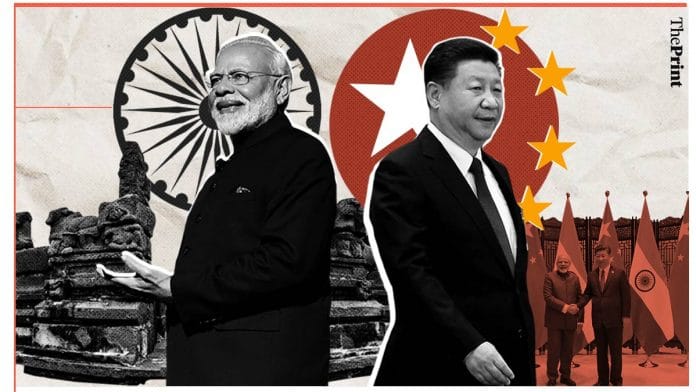Chinese President Xi Jinping and Prime Minister Narendra Modi will have a one-on-one meeting Saturday morning in the temple town of Mamallapuram. A hotline between New Delhi and Beijing and the border issue are likely to be discussed at the meet. The informal summit, which has become a grand spectacle, comes right after Pakistan PM Imran Khan’s China visit.
ThePrint asks: What can Modi-Xi agree on to call their Mamallapuram meeting a success?
China needs to understand it cannot and should not hyphenate India and Pakistan
 Rajiv Ranjan
Rajiv Ranjan
Assistant Professor at College of Liberal Arts, Shanghai University, China
While the informal meeting between Xi Jinping and Narendra Modi cannot bring a paradigm shift in bilateral ties, there are certain things that can be discussed and implemented to ensure that this summit is considered a success.
These are mainly based on four factors. The first point is border management. A high-level mechanism must be introduced to discuss this problem and resolve it conclusively. This must be a priority before we have another Doklam-like situation.
The second point that must be discussed at length is the trade deficit. This is proving to be a big hurdle in taking India-China relations to the next level. The two leaders should discuss the possibilities of business opportunities in India and also reach a consensus on China importing more from India. There should be a five-year plan to reduce the trade deficit from over $50 billion to $5-10 billion.
The third and fourth points are related in a way. Regarding regional tensions,
China needs to understand that it cannot and should not hyphenate India and Pakistan because this is impacting China’s foreign policy. This was the case with the US as well, but ever since it stopped clubbing India and Pakistan together, India-US relations have improved drastically.
Finally, the two countries must show the global community that they do share a consensus on some issues and that the West needs to see India and China as two Asian powers whose interests converge in some areas.
Also read: Modi & Xi will spend 6-7 hours together, discussing everything from Article 370 to trade
Low expectations from Modi-Xi summit — has no well-defined agenda & some fundamental issues prevail
 Manoj Kewalramani
Manoj Kewalramani
Fellow of China Studies, Takshashila Institution
My expectations from the Modi-Xi summit are very low for mainly two reasons. First, it is essentially an informal summit with no clearly-defined agenda, therefore, there will be only a few concrete outcomes from the meet.
Second relates to the situation between the two countries on fundamental issues in the last 6-8 months. China has been very slow to move on issues important to India such as membership in the United Nations Security Council or the Nuclear Suppliers Group. And it also took the Kashmir issue to the UN where it has zero locus standi. Even trade relations between India and China have been strained.
So, the current environment is not conducive to this summit. However, it is always a good idea to keep engaging in dialogue. To call this meeting a success, Modi and Xi must arrive at the conclusion that both India and China are rising powers and not let their differences turn into disputes.
Regarding the border issue, the best-case scenario would be a discussion on new confidence-building measures between the militaries of both countries to maintain peace and tranquillity.
I see no concrete direction on trade besides the broad rhetoric on the matter. What one can also expect is people-to-people contact and talk about fostering a cultural relationship between the two ancient civilisations to ensure that India-China relations are organic as opposed to only being diplomatically driven by leaders at the top.
Also read: Modi and Xi are unequal leaders who won’t tango in Mamallapuram but size each other up
Modi-Xi meet must impart certain stability to India-China relations, like what happened after Wuhan
 Ashok Kantha
Ashok Kantha
Former Indian Ambassador to the China
The first requirement from the informal meeting between Prime Minister Narendra Modi and Chinese President Xi Jinping is that it should impart a certain stability to the relationship, especially where differences have surfaced. There is a degree of strain and stress, so the summit should provide some stability to India-China relations in this regard, like the Wuhan summit.
Second, to ensure that this meeting is successful, both leaders will be discussing a range of bilateral issues to develop closer partnerships and improve trade ties. One can also hope for some progress on border-related issues and military confidence-building measures. They are likely to also talk about extending people-to-people contact in the run-up to the 70th anniversary of the establishment of diplomatic relations in 2020.
And third, a clear strategic message from the Mamallapuram summit to manage differences between India-China and make incremental progress on differences. One also hopes for a meaningful discussion on the current regional and global issues.
A pact to take economic ties forward can make all the difference & strengthen India-China relations
 Alka Acharya
Alka Acharya
Professor, Centre for East Asian Studies, JNU
The second informal summit between Prime Minister Narendra Modi and Chinese President Xi Jinping is more about giving strategic direction and signalling as opposed to signing agreements.
The current climate is one of tension with Xi Jinping’s scheduled visit to Nepal on 12 October and China’s increasingly close equation with Pakistan.
This informal summit can be a success if both India and China agree to continue the dialogue process and discuss ways to take it forward.
An agreement to take the economic ties forward can make all the difference and lead to strengthening of India-China relations. For example, if it is signalled that Huawei will be allowed to bid in the telecom bidding for 5G, then India can discuss what the Chinese can offer in return.
The meeting will be also be a success if both the parties can clearly speak about their sensitivities and the irritants affecting the India-China equation.
On the whole, if the India-China equation moves forward and if some clarity can be achieved on Chinese investments, then this meet can be called a success.
At the moment, there is not much India can do about the Pakistan-China equation. However, if India manages to convey to China that a united front against it will not be beneficial to anyone, it will be counted as a big success of the summit.
Initiatives like the informal summit can cause some discomfort to Pakistan
 Kanwal Sibal
Kanwal Sibal
Former foreign secretary and executive council member, VIF
The Modi-Xi meeting at Mamallapuram is an exercise in managing India-China ties and avoiding ‘differences from becoming disputes’. The negatives in our relationship outweigh the positives. Indeed, at the strategic level, China remains our biggest adversary. Any improvement in ties will not change this hard reality. China’s views on sovereignty and territorial claims, its militarisation of Tibet, shoring up Pakistan against us, the reality of CPEC, placing Kashmir on the UNSC agenda, targeting us on human rights, opposition to our NSG membership are key differences that informal summits will not easily resolve.
India has been circumspect in its response. Our improved ties with the US have a dynamic of their own. We have modified our approach to the Indo-Pacific. Raising the Quad to a ministerial level is essentially a political signal. On the Dalai Lama, Tibet, Xinjiang, Taiwan, we remain cautious.
China, under serious pressure from the US on trade and technology, is reaching out to India tactically. Given the uncertainty over Trump, we are not playing the US game fully. Initiatives like the informal summit have the plus of causing some discomfort to Pakistan. We are calibrating our China policy to suit our interests and maintain our strategic autonomy.
By Revathi Krishnan, journalist at ThePrint







Three hours will not suffice to remove six decades of baggage. 2. As an Indian, one cannot obviously be objective about a relationship that keeps the lights burning far into the night in South Block. Perhaps the two countries / governments need to ask each other, with sincerity and candour, Are we destined to remain adversaries for all time to come, or can we create synergies and areas of cooperation that will allow us to pursue our national development goals as we move along our non intersecting orbits. 3. A lot will depend on how China itself evolves. As almost the largest contributor / beneficiary of globalisation, it needs to consider whether it seeks dominion and hegemony, putting the whole world on edge, or it can handle its wealth, power and status with statesmanship.